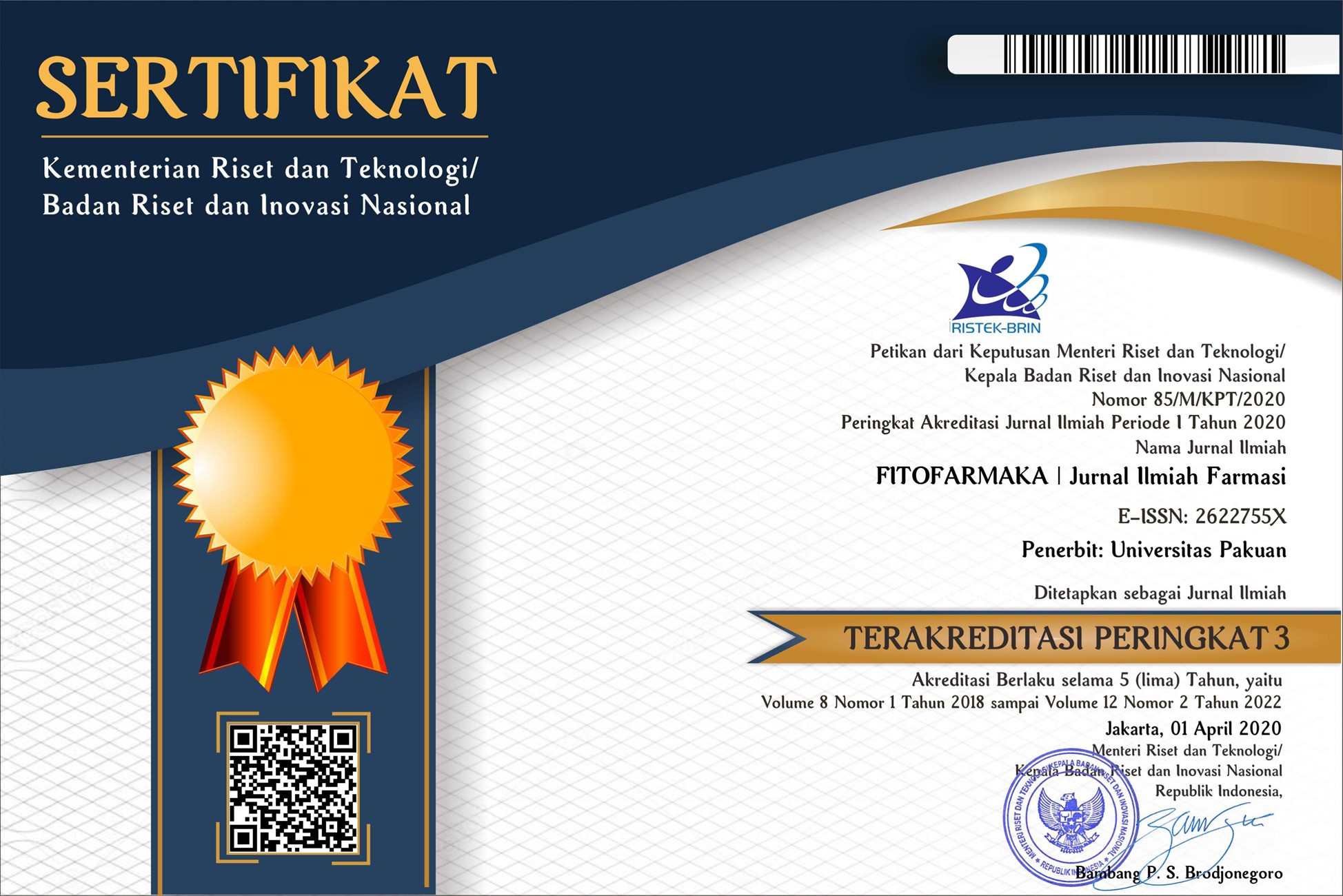The Potential of Phytotherapy In Managing Dyspepsia: A Narrative Review
Abstract
Dyspepsia, commonly known as indigestion, is delineated as suffering the manifestations of epigastric pain, nausea, burning, or after-meal fullness. The common therapy for dyspepsia, e.g., proton pump inhibitors or histamine-H2 receptor antagonists, has shown some adverse effects, thus, phytotherapy is currently becoming the drug of interest. Phytotherapy, additionally known as herbal medicine or botanical medicinal drug, includes the use of plant-derived compounds to prevent, alleviate, or therapy for diverse ailments. Most medications commonly used in Chinese traditional medicine or Asian folklore drugs contain mixtures of several plant extracts. Twelve clinical trials reported the effect and safety of phytotherapy on gastrointestinal disorders. Taken together, phytotherapy may be considered safe for the management of dyspepsia with close monitoring of the dose and duration of therapy.
Keywords
References
Choi, Y., Kim, N., Noh, G. T., Lee, J. Y., & Lee, D. H. (2020). The efficacy and safety of GCWB104 (flos Lonicera extract) in functional dyspepsia: A single-center, randomized, double-blind, placebo-controlled study. Gut and Liver, 14(1), 67–78. https://doi.org/10.5009/gnl19283
Dehghani, S. M., Imanieh, M. H., Oboodi, R., & Haghighat, M. (2011). The comparative study of the effectiveness of cimetidine, ranitidine, famotidine, and omeprazole in treatment of children with dyspepsia. ISRN Pediatrics.
Du, H.-G. (2014). Xiaoyao pill for treatment of functional dyspepsia in perimenopausal women with depression. World Journal of Gastroenterology, 20(44), 16739. https://doi.org/10.3748/wjg.v20.i44.16739
Du, L.-J., Chen, B.-R., Kim, J. J., Kim, S., Shen, J.-H., & Dai, N. (2016). Helicobacter pylori eradication therapy for functional dyspepsia: Systematic review and meta-analysis. World Journal of Gastroenterology, 22(12), 3486–3495. https://doi.org/10.3748/wjg.v22.i12.3486
Ford, A. C., Mahadeva, S., Carbone, M. F., Lacy, B. E., & Talley, N. J. (2020). Functional dyspepsia. The Lancet, 396(10263), 1689–1702. https://doi.org/10.1016/s0140-6736(20)30469-4
Francis, P., Zavala, S. R. (2022). Functional Dyspepsia. Bookshelf ID: NBK554563 PMID: 32119450. StatPearls [Internet]. StatPearls Publishing LLC.
Ha, N.-Y., Kim, S., Ko, S.-J., Park, J.-W., & Kim, J. (2023). Efficacy and safety of the herbal formula Naesohwajung-tang for functional dyspepsia: a randomized, double-blind, placebo-controlled, multi-center trial. Frontiers in Pharmacology, 14. https://doi.org/10.3389/fphar.2023.1157535
Hajiaghamohammadi, A. A., Zargar, A., Oveisi, S., Samimi, R., & Reisian, S. (2016). To evaluate of the effect of adding licorice to the standard treatment regimen of Helicobacter pylori. The Brazilian Journal of Infectious Diseases, 20(6), 534–538. https://doi.org/10.1016/j.bjid.2016.07.015
Kitagawa, H., Munekage, M., Matsumoto, T., Sadakane, C., Fukutake, M., Aoki, K., Watanabe, J., Maemura, K., Hattori, T., Kase, Y., Uezono, Y., Inui, A., & Hanazaki, K. (2015). Pharmacokinetic Profiles of Active Ingredients and Its Metabolites Derived from Rikkunshito, a Ghrelin Enhancer, in Healthy Japanese Volunteers: A Cross-Over, Randomized Study. PLOS ONE, 10(7), e0133159. https://doi.org/10.1371/journal.pone.0133159
Lazzini, S., Polinelli, W., Riva, A., Morazzoni, P., Bombardelli, E., & Riva, A. (2016). The effect of ginger (Zingiber officinalis) and artichoke (Cynara cardunculus) extract supplementation on gastric motility: a pilot randomized study in healthy volunteers.
LiverTox: Clinical and Research Information on Drug-Induced Liver Injury [Internet]. Bethesda (MD): National Institute of Diabetes and Digestive and Kidney Diseases; 2012-. Histamine Type-2 Receptor Antagonists (H2 Blockers) [Updated 2018 Jan 25]. Available from: https://www.ncbi.nlm.nih.gov/books/NBK547929/
Lv, L., Wang, F.-Y., Ma, X.-X., Li, Z.-H., Huang, S.-P., Shi, Z.-H., Ji, H.-J., Bian, L.-Q., Zhang, B.-H., Chen, T., Yin, X.-L., & Tang, X.-D. (2017). Efficacy and safety of Xiangsha Liujunzi granules for functional dyspepsia: A multi-center randomized double-blind placebo-controlled clinical study. World Journal of Gastroenterology, 23(30), 5589. https://doi.org/10.3748/wjg.v23.i30.5589
Madisch, A., Andresen, V., Enck, P., Labenz, J., Frieling, T., & Schemann, M. (2018). The Diagnosis and Treatment of Functional Dyspepsia. Deutsches Ärzteblatt International. https://doi.org/10.3238/arztebl.2018.0222
Miwa, H., Nagahara, A., Asakawa, A., Arai, M., Oshima, T., Kasugai, K., Kamada, K., Suzuki, H., Tanaka, F., Tominaga, K., Futagami, S., Hojo, M., Mihara, H., Higuchi, K., Kusano, M., Arisawa, T., Kato, M., Joh, T., Mochida, S., & Enomoto, N. (2022). Evidence-based clinical practice guidelines for functional dyspepsia 2021. Journal of Gastroenterology, 57(2), 47–61. https://doi.org/10.1007/s00535-021-01843-7
Orel, R., Benninga, M. A., Broekaert, I. J., Gottrand, F., Papadopoulou, A., Ribes-Koninckx, C., Thomson, M., Wilschanski, M., & Thapar, N. (2021). Drugs in Focus: Proton Pump Inhibitors. Journal of pediatric gastroenterology and nutrition, 72(5), 645–653. https://doi.org/10.1097/MPG.0000000000003063
Oustamanolakis, P., & Tack, J. (2012). Dyspepsia: organic versus functional. Journal of Clinical Gastroenterology, 46(3), 175–190. https://doi.org/10.1097/MCG.0b013e318241b335
Ried, K., Travica, N., Dorairaj, R., & Sali, A. (2020). Herbal formula improves upper and lower gastrointestinal symptoms and gut health in Australian adults with digestive disorders. Nutrition Research, 76, 37–51. https://doi.org/10.1016/j.nutres.2020.02.008
Stanghellini, V., Chan, F. K. L., Hasler, W. L., Malagelada, J. R., Suzuki, H., Tack, J., & Talley, N. J. (2016). Gastroduodenal disorders. Gastroenterology, 150(6), 1380–1392. https://doi.org/10.1053/j.gastro.2016.02.011
Su, Q., Chen, S.-L., Wang, H.-H., Liang, L.-X., Dai, N., Lyu, B., Zhang, J., Wang, R.-Q., Zhang, Y.-L., Yu, Y., Liu, J.-S., & Hou, X.-H. (2018). A randomized, double-blind, multicenter, placebo-controlled trial of Qi-Zhi-Wei-Tong granules on postprandial distress syndrome-predominant functional dyspepsia. Chinese Medical Journal, 131(13), 1549–1556. https://doi.org/10.4103/0366-6999.235118
Tomita, T., Oshima, T., & Miwa, H. (2018). New Approaches to Diagnosis and Treatment of Functional Dyspepsia. Current Gastroenterology Reports, 20(12), 55. https://doi.org/10.1007/s11894-018-0663-4
Wang, W., Yang, L., Song, L., Guo, M., Li, C., Yang, B., Wang, M., Kou, N., Gao, J., Qu, H., Ma, Y., Xue, M., & Shi, D. (2021). Combination of Panax notoginseng saponins and aspirin potentiates platelet inhibition with alleviated gastric injury via modulating arachidonic acid metabolism. Biomedicine & Pharmacotherapy, 134, 111165. https://doi.org/10.1016/j.biopha.2020.111165
Wroblewski, L. E., Peek, R. M., Jr, & Wilson, K. T. (2010). Helicobacter pylori and gastric cancer: factors that modulate disease risk. Clinical Microbiology Reviews, 23(4), 713–739. https://doi.org/10.1128/CMR.00011-10
Xu, L., Zhang, J., Li, J., Lv, L., Zhang, Z., Wang, F., & Tang, X. (2020). Clinical study on post evaluation after listing of Qizhi Weitong granules. Medicine, 99(16), e19758. https://doi.org/10.1097/md.0000000000019758
Zhang, Y., Bian, L., Long, H., Zhang, W., & Hu, Y. (2021). Efficacy evaluation of acupuncture combined with Liujunzi Decoction in the treatment of functional dyspepsia. Medicine, 100(8), e24528. https://doi.org/10.1097/md.0000000000024528
DOI: 10.33751/jf.v13i2.8255
 Abstract views : 98
Abstract views : 98
Refbacks
- There are currently no refbacks.















